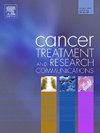ERO1α regulates curcumin-induced autophagy via PI3K/AKT pathway
IF 2.4
Q3 Medicine
引用次数: 0
Abstract
Objective
Through comprehensive analysis of cisplatin-resistant HeLa cervical cancer cells, we reveal that curcumin exerts potent anti-cancer effects by modulating autophagic processes, and further identify Endoplasmic reticulum oxidoreductase 1-alpha (ERO1α) as a key regulator mediating this biological response.
Methods
Cell proliferation was assessed using Cell Counting Kit-8 (CCK-8). The immunoblotting analysis measured the Phosphoinositide 3-Kinase/ Protein Kinase B (PI3K/AKT) pathway-related proteins, Microtubule-associated protein 1A/1B-light chain 3 (LC3II/I) ratio, and Beclin-1 expression. The cell migration ability was evaluated through a scratch assay.
Results
Curcumin significantly inhibits the proliferation and migration of cisplatin-resistant HeLa cells. It promotes autophagy in these cells, as shown by the upregulation of autophagy-related proteins Beclin-1 and LC3II/I. Curcumin also downregulates ERO1α expression, subsequently modulating the PI3K/AKT pathway. Interestingly, the overexpression of ERO1α or activation of PI3K negated the autophagy-promoting effects of curcumin, indicated by the absence of changes in autophagy-related proteins and phosphorylation levels of PI3K/AKT.
Conclusions
Our study provides compelling evidence that curcumin inhibits the proliferation and migration of cisplatin-resistant HeLa cells by promoting autophagy through the downregulation of ERO1α and inhibition of the PI3K/AKT pathway.
ERO1α通过PI3K/AKT通路调控姜黄素诱导的自噬
目的通过对顺铂耐药HeLa宫颈癌细胞的综合分析,揭示姜黄素通过调节自噬过程发挥强大的抗癌作用,并进一步确定内质网氧化还原酶1- α (ERO1α)是介导这一生物反应的关键调控因子。方法采用细胞计数试剂盒-8 (CCK-8)检测细胞增殖。免疫印迹法检测磷酸肌苷3-激酶/蛋白激酶B (PI3K/AKT)通路相关蛋白、微管相关蛋白1A/ 1b -轻链3 (LC3II/I)比值、Beclin-1表达。通过划痕实验评估细胞迁移能力。结果莪术素能明显抑制顺铂耐药HeLa细胞的增殖和迁移。它促进这些细胞的自噬,如自噬相关蛋白Beclin-1和LC3II/I的上调。姜黄素也下调ERO1α的表达,从而调节PI3K/AKT通路。有趣的是,过度表达ERO1α或激活PI3K会否定姜黄素促进自噬的作用,这表明自噬相关蛋白和PI3K/AKT磷酸化水平没有变化。结论姜黄素通过下调ERO1α和抑制PI3K/AKT通路促进自噬,从而抑制顺铂耐药HeLa细胞的增殖和迁移。
本文章由计算机程序翻译,如有差异,请以英文原文为准。
求助全文
约1分钟内获得全文
求助全文
来源期刊

Cancer treatment and research communications
Medicine-Oncology
CiteScore
4.30
自引率
0.00%
发文量
148
审稿时长
56 days
期刊介绍:
Cancer Treatment and Research Communications is an international peer-reviewed publication dedicated to providing comprehensive basic, translational, and clinical oncology research. The journal is devoted to articles on detection, diagnosis, prevention, policy, and treatment of cancer and provides a global forum for the nurturing and development of future generations of oncology scientists. Cancer Treatment and Research Communications publishes comprehensive reviews and original studies describing various aspects of basic through clinical research of all tumor types. The journal also accepts clinical studies in oncology, with an emphasis on prospective early phase clinical trials. Specific areas of interest include basic, translational, and clinical research and mechanistic approaches; cancer biology; molecular carcinogenesis; genetics and genomics; stem cell and developmental biology; immunology; molecular and cellular oncology; systems biology; drug sensitivity and resistance; gene and antisense therapy; pathology, markers, and prognostic indicators; chemoprevention strategies; multimodality therapy; cancer policy; and integration of various approaches. Our mission is to be the premier source of relevant information through promoting excellence in research and facilitating the timely translation of that science to health care and clinical practice.
 求助内容:
求助内容: 应助结果提醒方式:
应助结果提醒方式:


